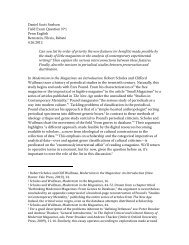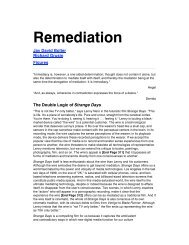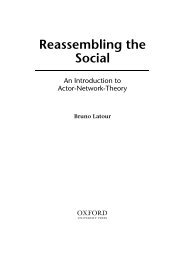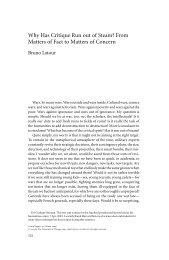The Exploit: A Theory of Networks - asounder
The Exploit: A Theory of Networks - asounder
The Exploit: A Theory of Networks - asounder
You also want an ePaper? Increase the reach of your titles
YUMPU automatically turns print PDFs into web optimized ePapers that Google loves.
Prolegomenon 11<br />
Provisional Response 4: Occultism and Cryptography<br />
(the Nominalist Argument)<br />
A final interpretation should be noted. In all our discussion thus far,<br />
we have been assuming that the “United Nations” and the “United<br />
States” mean specific things. But in any contemporary situation, the<br />
issue <strong>of</strong> naming, or indeed the problem <strong>of</strong> substituting a title or name<br />
for a larger group, has to be recognized. After all, while it is the job <strong>of</strong><br />
certain people to make decisions, the decisions made by “the American<br />
administration” are not decisions made solely by a single person<br />
or even a single entity. And yet our language shores up this assumption,<br />
in the very way that language personifies collective entities.<br />
This happens all the time. It becomes a sort <strong>of</strong> linguistic shorthand<br />
to say that the United States does this, or that al - Qaeda does that.<br />
Naming is nevertheless a tricky business; it leads to the problem <strong>of</strong><br />
individuation. <strong>The</strong> United States’ reaction to September 11, 2001, is<br />
indicative <strong>of</strong> the problem <strong>of</strong> individuation. Immediately after the<br />
attacks, two contradictory statements were insistently repeated in<br />
the media and by the government: that there is a “new enemy” constituting<br />
international networks <strong>of</strong> people, arms, money, information,<br />
and ideology; and that the name <strong>of</strong> this distributed new enemy is<br />
“terrorism” or even “al - Qaeda.” In the same breath, we see the statement<br />
that our new enemy is networked and distributed to such a degree<br />
that it cannot be named. And yet there continues the persistent<br />
naming <strong>of</strong> the entity - that - cannot - be - named. What is obvious and<br />
immediate is the same thing that is shadowy and unknown. <strong>The</strong> plain<br />
is the obscure; the common is the cryptic.<br />
But this is only the most explicit example <strong>of</strong> what is a much<br />
more basic issue concerning naming, especially when thinking about<br />
networks.<br />
Any instance <strong>of</strong> naming always produces its shadowy double: nominalism,<br />
that is, the notion that universal descriptors do not adequately represent<br />
the referents they are supposed to name or demarcate.<br />
Naming indicates its own impossibility. So perhaps the sovereign -<br />
network debate is really only a problem <strong>of</strong> naming. Perhaps it is a









